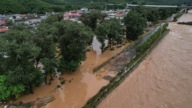【新唐人2014年02月04日讯】2月2号是第18个“世界湿地日”,但世界各地的湿地情况却不容乐观,尤其中国大陆在近十年间,湿地出现大面积减少现象,人为破坏和基建占用情况极为严重,保护湿地刻不容缓。
“世界湿地日”前夕,大陆林业局副局长张永利在新闻发布会上透露,据全国第二次湿地自由调查结果显示,近10年来,中国自然湿地面积减少了337万公顷,减少率高达9.33%。这一数据引发了很多湿地保护专家与学者的关注。
湿地,又被称作“自然之肾”,是地球生态环境的重要组成部分,与森林、海洋一起并称为全球三大生态系统。对人类、生物与自然环境有着极为宝贵和巨大作用。
台湾环境资讯协会湿地保护专案执行人员表示,湿地就像大地的海绵,有调整洪流的功能。
台湾环境资讯协会湿地保护专案执行人员翁女士:“水流经过湿地的时候,它会将速度减缓,留住水中的养份,也可以去过滤水里金属化合物、有毒物质﹔湿地也是一个很重要的基础生物的食物链,它可以造就很多的生物多样性。它也是人类很重要的一个食物来源,像古文明的文化和发源地,经常在和河流旁的泛滥平原。”
台湾环境资讯协会两岸交流专案执行人员叶人豪:“因为湿地在现代气候变迁的部分,它其实也是调试气候的一个部分,也是蛮重要的。或者是在物种保育的状态,其实对人类影响都是蛮大的。”
台湾环境资讯协会湿地保护专案执行人员翁女士表示,失去了湿地,相对失去了平衡地球环境的功能。
翁女士:“少了湿地的话,将会减少调节洪流的功能,干旱的时候,土地缺乏储水的能力,我们将不会有足够地下水或农田的灌溉,在湿地的沿岸地区,大雨或洪水泛滥的时候,周边的村庄生物将会濒临死亡。湿地减少了,它就减少了净化水质的功能。”
可以说,近年来,大陆发生的地下水枯竭、洪水肆虐、气候反常等等灾难,都与湿地的减少有一定关系。但中国的湿地究竟是如何减少的呢?
张永利公开表示:造成湿地面积大幅度减少的主要原因,除了气候变化等一些自然因素外,人类活动占用和改变湿地用途是其主要原因。其中围垦和基建占用,是导致湿地面积大幅度减少的两个最关键因素。
北京环保志愿者、民间水专家张俊峰:“这几年,由于房地产价值非常高,所以人们又开始把这些湿地填平之后去开发房地产,所以这一点在中国尤其是像洞庭湖、武汉、还有长江流域附近,包括南方,这方面事情非常非常多。所以造成了这种湿地逐渐消失的情况。”
张永利指出,近十年来,受基建占用威胁的湿地面积多达129万公顷,比2003年增长了近10倍。巨大的数字背后,折射出了在当权者眼中,短期的经济利益,在环境保护与经济发展之间的博弈中占了上风。
张俊峰:“地方政府,它们追求的是眼前的利益。它不会追求长远的生态平衡也好,还是其他的社会发展也好。那么这种眼前利益的追求,它们就放弃了很多长远的东西,实际上这种政府的管理模式,就造成了地方政府在追求短期利益的同时,促进它恶性发展的这样一些作用。”
中共当局至今没有出台保护中国的湿地的法规。有的仅仅是各地形同虚设的所谓“保护条例”。广西壮族自治区林业厅副厅长刘中奇,面对不断消失的海岸线曾愤怒的说:到处都在填海,为什么填呢?因为便宜啊。填海比征地来得便宜和简单,而且又没有法律去约束它。
环保人士吐槽讽刺:森林有森林法,土地有土地法,海洋有海洋法,而湿地没有法,这等于湿地可以乱破坏,把湿地毁了,把它变成开发区了也没事,没人追究,因为没有法嘛!
采访编辑/张天宇 后制/ 李勇
Diminishing Wetlands in the Name of Construction February 2 marks the 18th World Wetlands Day.
While wetlands are facing disastrous destruction world wide, in China, wetlands have also experienced a decade of damage and reduction.
On the eve of World Wetlands Day, the Chinese State Forestry Administration Deputy Director Zhang Yongli said at the press conference, according to the second national wetland survey, China has lost 3.37 million hectares of wetland, a reducing rate of 9.33% in the past decade.
The data has immediately raised concern among many wetland experts and scholars.
Wetlands are also known as Nature’s kidneys.
Along with forests and oceans, they are the world’s three major ecosystems valuable to humans, biology and nature.
According to Taiwan Environmental Information Association,
wetlands are like the sponge of the earth. They help to protect during floods.
Ms. Weng, staff at wetlands protection project, (TEIA):"Wetlands slow down the flow speed, retain nutrients, and filter out metal and toxic compounds in the flow. Wetlands are also part of fundamental food chains. They provide biodiversity. They also serve major food sources. Many ancient cultures and civilizations took place next to the flood plains."
Ye Ren-Hao, staff member at cross strait project, (TEIA) :"Wetlands adjust weather and have a major impact on weather transition. They also conserve natural species and are important to humans."
TEIA staff member Ms. Weng indicates that loss of wetlands is equivalent to the loss of environmental balances of the earth.
Ms. Weng: “Loss of wetlands will lose flood regulation. During the dry season, the land will lose the capacity of water storage, leading to insufficient groundwater or irrigation of farmland. During the flood season, surrounding organisms will face devastating effects because of lack of water purification from the wetlands."
It can be said that depletion of groundwater, floods, and erratic weather disasters in China in recent years have a certain relationship with the reduction in wetlands.
But what has caused the reduction of China’s wetlands?
Zhang Yongli said publicly: “Other than natural factors such as climate change; human activity to occupy and convert wetlands for other purposes are the main reasons for significant decrease in wetland area," and “Enclosure for cultivation and land reclamation are the two most critical factors that lead to a substantial reduction in wetland area."
Beijing environmentalist Zhang Junfeng: “In recent years, high real estate value has driven real estate development on the wetlands.
It is happening widely in China, such as at Dongting Lake,Wuhan, the Yangtze River basin, where the wetlands are filled to develop real estate.
That has caused the gradual disappearance of wetlands."
Zhang Yongli pointed out that over the past decade, real estate has threatened as many as 1.29 million hectares of wetland area, an increase of nearly 10 times more than in 2003.
It reflects short-term economic interests prevail in the game
between environmental protection and economic development
in the eyes of those in power.
Zhang Junfeng: “Local governments’ pursuit of the immediate benefits has ignored the long-term ecological balance or social development.
This type of management has created a vicious cycle of development."
There has been no wetland legal protection in China today. Some so-called protection regulations are only superficial. Facing the disappearing coastline, Guangxi Forestry Department deputy director Liu Zhongqi, has said angrily: Reclamation is taking place everywhere. Why? Because it’s cheap.
Land reclamation is cheaper and easier than land requisition. Especially as it’s not subject to legal regulation.
Environmentalists have complained: There are Forest, Land, and Sea Laws. Wetlands don’t have any regulation. That means wetlands can be destroyed at will and developed into real estate. Because it is lawless!
Interview & Edit/Zhang Tianyu Post-Production/LiYong






























